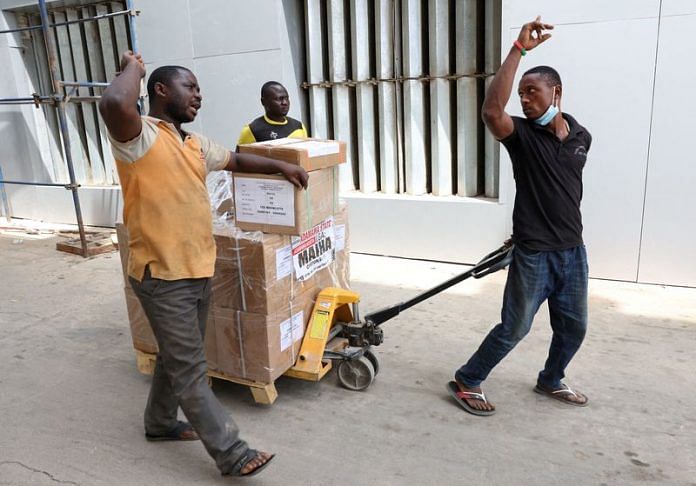By Anamasere Igboereteonwu
ONITSHA, Nigeria (Reuters) -A Nigerian senatorial candidate from one opposition party and the driver of a campaign minibus belonging to another were killed in a series of coordinated attacks in southeastern Enugu State ahead of an election on Saturday, police said on Thursday.
Nigerians are due to elect their next president and lawmakers on Saturday against a chaotic backdrop of armed conflict in the northeast, high levels of crime and shortages of cash, fuel and electricity.
Africa’s most populous nation, biggest economy and top oil producer switched from army rule to democracy in 1999, but its elections have long been plagued by violence and fraud.
U.S. President Joe Biden earlier called for a peaceful, transparent election, urging parties and candidates to accept the results when they are published by the Independent National Electoral Commission (INEC).
Enugu State police said suspected members of two Biafran separatist groups that have been banned by Nigerian authorities targeted vehicles from three political parties in simultaneous incidents at separate locations late on Wednesday.
They confirmed the death of Labour Party senatorial candidate Oyibo Chukwu, earlier reported by his party, and said the driver of a People’s Democratic Party (PDP) campaign minibus had also been killed in a separate attack.
In both cases, the attackers set vehicles ablaze with petrol bombs, burning to death their occupants, police said. Chukwu’s driver was also killed.
Police said a similar attempted attack on the ruling All Progressives Congress (APC) party’s gubernatorial candidate in Enugu had been repelled.
The Enugu State police commissioner, Ahmed Ammani, in a statement urged citizens “not to succumb to the cowardly antics of the hoodlums, which is aimed at creating fear and to disrupt the electoral process”.
TIGHT RACE
With President Muhammadu Buhari stepping down after serving the maximum two terms allowed by the constitution, the three-man race to succeed him is seen as the most unpredictable in recent Nigerian history.
Former Lagos governor Bola Tinubu, 70, represents the ruling APC, former vice president Atiku Abubakar, 76, represents the main opposition PDP, while the Labour Party’s Peter Obi, 61, is seen as an anti-establishment candidate popular among many young voters.
At a news briefing in the federal capital Abuja, INEC Chairman Mahmood Yakubu said the public could be confident in the electoral commission’s preparations.
“In this election we put everything in place for free choice, fair contest and credible outcome,” he said.
He made no reference to events in Enugu.
Chinwuba Ngwu, the Labour Party chairman in the Enugu South local government area, said the death of its senatorial candidate Chukwu was devastating.
“We are suspecting political assassination because he is favoured to win the election,” Ngwu said.
A spokesperson for the Enugu branch of INEC said it had the power under electoral law to suspend a poll in the event of a candidate’s death and set a new date within 14 days. However, he said no decision had been made yet in this case.
Enugu State is part of the southeastern heartland of the Igbo ethnic group. The region tried to secede from Nigeria in 1967 under the name Republic of Biafra, triggering a three-year civil war in which a million people died, mostly of starvation.
In recent years, poverty, joblessness and a sense of political marginalisation among many Igbo have driven a revival of interest in Biafran separatism, leading to the emergence of groups such as the Indigenous People of Biafra (IPOB) and the paramilitary Eastern Security Network (ESN). Both are banned.
Enugu police named both groups in their statement on Thursday, saying suspected members were behind the attacks.
Human rights groups say the use of excessive and arbitrary force by Nigerian security forces in the southeast has fuelled violence in the region, and that while some Biafran activists have committed violent acts, there have been cases where they have been wrongly blamed for the acts of other criminals.
(Additional reporting by Camillus Eboh in Abuja; Writing by Estelle Shirbon; Editing by John Stonestreet and Bill Berkrot)
Disclaimer: This report is auto generated from the Reuters news service. ThePrint holds no responsibilty for its content.



